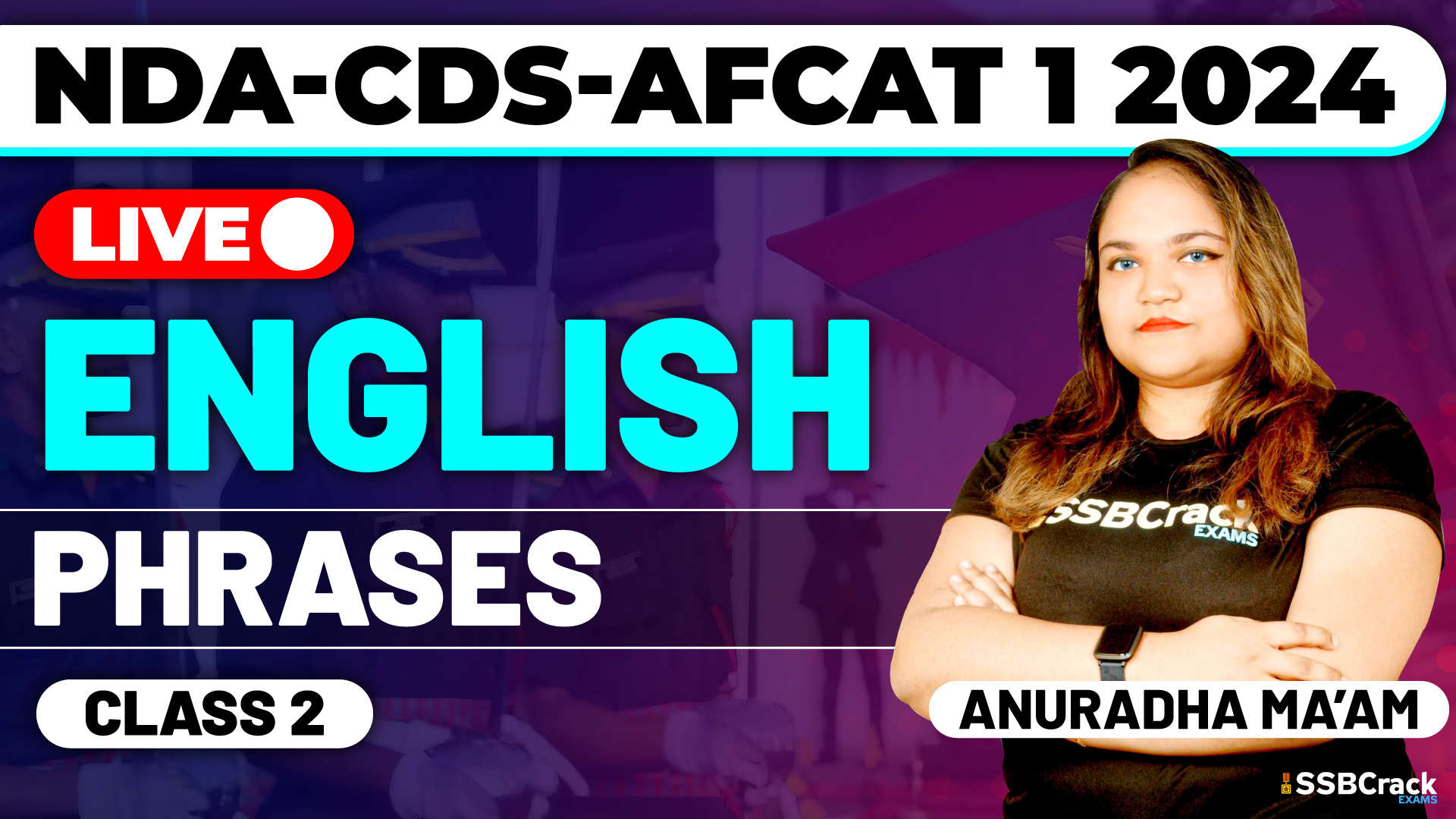In the intricate tapestry of the National Defence Academy (NDA), Combined Defence Services (CDS), and Air Force Common Admission Test (AFCAT) examinations, language proficiency stands as a fundamental pillar of success. Among the linguistic challenges presented in the English section, the exploration of “Phrasal Verbs” emerges as a pivotal domain. This article unravels the importance of mastering phrasal verbs in these esteemed examinations, drawing insights from Phrases Live Class 2 and offering strategic approaches for aspirants to navigate this nuanced linguistic landscape.
Directions: Given below are some idioms/phrases followed by four alternative meanings to each. Choose the response (a), (b), (c), (d) which is the most appropriate expression and mark your response to the answer sheet accordingly.
Q) Go over
(a) To go to someone’s house
(b) Review
(c) To run away
(d) To do grocery shopping
Ans. (b)
Q) Give up
(a) To win
(b) Stop consuming or doing something as a habit
(c) To donate
(d) To catch a culprit red-handed
Ans. (b)
Q) Get to
(a) Bother someone
(b) To start working
(c) To go to someone else’s house
(d) To run
Ans. (a)
Q) Get through
(a) To endure an unpleasant experience
(b) To go through a tough security
(c) To win
(d) To fall ill
Ans. (a)
Q) Get around to
(a) To take a roundabout way
(b) To come back to one’s place
(c) To do something eventually
(d) To believe
Ans. (c)
Q) Dive into
(a) To eagerly begin an activity
(b) To swim
(c) To go into the deep sea
(d) To fall down
Ans. (a)
Q) Crack down on
(a) To yell at someone
(b) To develop a crack
(c) To break into pieces
(d) To punish someone harshly
Ans. (d)
Q) Come up with
(a) To get invited
(b) To come with a friend
(c) To think of an idea
(d) To have fever
Ans. (c)
Q) Come down with
(a) To catch an illness
(b) To come downstairs
(c) To go to the basement
(d) To get a brilliant idea
Ans. (a)
Q) Clean up
(a) To be an extreme failure
(b) To be extremely successful in an endeavor
(c) To clean cars
(d) To look smart
Ans. (b)
For more questions, check out NDA-CDS-AFCAT 1 2024 Exam English Live – Phrases – Class 2
Understanding Phrasal Verbs
Phrasal verbs are combinations of verbs with one or more particles (prepositions or adverbs). They often carry meanings distinct from the sum of their individual parts. Proficiency in phrasal verbs not only showcases a strong command of the English language but also aids in effective communication, a skill integral to military roles.
The Significance of Phrasal Verbs in NDA, CDS, and AFCAT Exams
- Expressive Communication: Phrasal verbs add depth and nuance to communication. Mastering them allows candidates to express ideas, instructions, and commands more dynamically and precisely.
- Real-world Relevance: Military documents and communication often employ phrasal verbs. A solid understanding is crucial for interpreting orders, directives, and reports accurately.
- Reading Comprehension: Proficiency in phrasal verbs enhances reading comprehension skills. Military personnel encounter texts filled with these expressions, demanding a keen grasp for a comprehensive understanding.
- Effective Writing: The ability to use phrasal verbs appropriately enhances writing skills. Military officers frequently engage in written communication, and a command of phrasal verbs contributes to clarity and conciseness.
- Cultural and Informal Context: Phrasal verbs are often used in casual, everyday language. Mastery of these expressions demonstrates cultural and linguistic awareness, a valuable asset in diverse and dynamic military settings.
Strategies to Master Phrasal Verbs
- Contextual Analysis: Understand the context in which the phrasal verb is used to decipher its intended meaning accurately.
- Thematic Learning: Group phrasal verbs thematically based on common themes or shared meanings to aid memory retention.
- Interactive Learning: Engage in conversations and discussions where phrasal verbs are commonly used, facilitating interactive and practical learning.
- Visual Mnemonics: Use visual aids or mnemonics to associate phrasal verbs with images, aiding recall and comprehension.
- Regular Practice: Consistent practice with exercises and quizzes focused on phrasal verbs contributes to familiarity and mastery.
- Reading Widely: Exposure to a variety of texts exposes candidates to different phrasal verbs in diverse contexts, fostering a comprehensive understanding.
- Utilize Technology: Explore online resources and apps designed to aid in learning and practicing phrasal verbs.
Conclusion
Mastering phrasal verbs in the context of NDA, CDS, and AFCAT examinations extends beyond the confines of a standardized test. It is a gateway to refined language proficiency, effective communication, and cultural awareness – traits essential for success in military roles. Aspirants should recognize the importance of phrasal verbs not merely as a test requirement but as an integral step toward developing a linguistic skill set that aligns with the dynamic demands of a military career. The ability to navigate and employ phrasal verbs is not just an academic achievement; it is a stride towards becoming an articulate, adaptable, and effective military officer.







